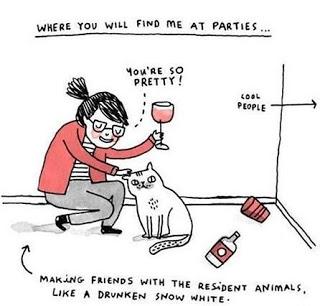
Not all people with Asperger's syndrome are introverted, in fact there are many flamboyant and loud people with Asperger's (and that category deserves a post of its own).
I'd venture to say though, that most of the people I've met with Asperger's have tended to be the shy, quiet type. Of course, that might just be me as being shy and quiet myself.
After all, I'm far more likely to be open in discussions with introverted individuals.
There's nothing wrong with Introversion
In western society, it often feels as if introversion is a problem that needs to be “cured” but it's not.Introverts, particularly those with Asperger's, are often perfectly capable of “acting” extroverted when a situation calls for it. It's important to remember though that it's just an act and it takes a lot of effort to maintain. We often find ourselves feeling more stressed and grumpier after having had to act that way for a while.
Being introverted or extroverted is a personality trait that we probably have from birth but which is reinforced throughout our lives in every interaction we have with others.
As a parent, you might want your child to be more extroverted but choosing to try to change their personality is not a good parenting decision. Your child will flourish best by being themselves.
Life as an Introvert
Introverts are all different and there are varying extremes and exceptions. Just like everyone with Asperger's syndrome, no two people are exactly alike.I find that as an introvert with Asperger's my responses to direct questions tend to be slower and more carefully thought out. This causes a few problems because sometimes people don't wait for an answer and often people speak for me. It can be irritating at times because often others don't say what I was intending to say.
 Other introvert problems include getting invited to functions, parties or even just family gatherings and finding it difficult to get into a conversation - especially if you don't know anyone else.
Other introvert problems include getting invited to functions, parties or even just family gatherings and finding it difficult to get into a conversation - especially if you don't know anyone else.I'll often walk to the edge of a group and stand there smiling until I get tired of not being noticed. After doing this with a few groups, I'll just find a space near a wall and keep to myself.
Unless of course, they have pets. In those situations, I usually become the dog’s best friend.
One thing that I have learned to do recently is to scan the room and look for other people in my situation (against walls by themselves or playing with pets or their phones).
Clearly introverts seem to get on much better with other introverts.
Complaints and Help
As an introvert, I'm not keen on drawing attention to myself and I'll often put up with poor service rather than start a confrontation. This often creates friction between my wife and I as she is not one to hold back. In restaurants with poor service, I often find myself looking down at the table and wishing I was somewhere else while my wife chews out the waiter or management.Fortunately, my wife has now started to learn to pick her battles because poor service is one thing but fighting with staff can ruin a night out.
In any case, if the service is particularly bad (or good), I’ll leave a review and sometimes I'll send emails to head office. My writing is never too shy to tackle the important points.
It's the same deal when I'm out shopping, particularly for appliances. If I go shopping by myself, the appearance of a salesperson asking if I need help usually hastens my exit from the shop but if I go with my wife or managers from work, it's generally the opposite for them. They'll leave the shop if they don't get attention soon enough.
Hero Syndrome
“Hero Syndrome” is a made up problem so there's no need to look it up. It's the name I give to some of the behavior mentioned earlier. My wife often accuses me of "trying to be a hero" but it's just the introversion talking. The crux of “Hero Syndrome” is that “taking one for the team” without complaint makes it easier to accept a problem than it is to interact with a person in order to get it resolved. You could see this as laziness or conflict avoidance but given that I behave this way in situations which are not confrontational, it's more likely to be simply; "people avoidance".
My wife often accuses me of "trying to be a hero" but it's just the introversion talking. The crux of “Hero Syndrome” is that “taking one for the team” without complaint makes it easier to accept a problem than it is to interact with a person in order to get it resolved. You could see this as laziness or conflict avoidance but given that I behave this way in situations which are not confrontational, it's more likely to be simply; "people avoidance".For example; I was recently in hospital and left in a room with a light on with no way to turn it off. I could have buzzed the nurse at any time but instead I simply tried to sleep with the light on. Eventually a nurse noticed the problem and rectified it. My wife was quite annoyed about this but I didn’t want to make a fuss.
Hero syndrome raises its head at all kinds of odd times, for example, when we’re not given the correct meal, or the meal is not properly cooked, when we’re waiting too long for service or when we’re given the incorrect change.
Most of the time, “hero syndrome” simply makes you into a more patient person but sometimes it makes you a victim. Sometimes being introverted can be a real problem.
Being Loud When Required
It’s a myth to say that introverts can’t be loud. It just takes a lot of extra effort. Introverts can be great public speakers but not great on small group interactions. They can be experts on specific topics but find themselves unable to interact in small-talk. Introverts can be good bosses too, particularly if they come from a position of strength, such as the knowledge (special interests) and abilities. For example, introverts often find communicating via email works better for them or that empowering other staff members to chair their meetings is more effective. If this works, then there’s no reason not to engage staff members in this manner. Quite often, this makes introverts better teachers and mentors than extroverts.
For example, introverts often find communicating via email works better for them or that empowering other staff members to chair their meetings is more effective. If this works, then there’s no reason not to engage staff members in this manner. Quite often, this makes introverts better teachers and mentors than extroverts.One thing that introverted people and people with Asperger’s often have in common is the need to find solitude after a particularly “social” period. Effective introverted managers do this by organising their time effectively or organising “low social” recreational activities, such as swimming or climbing.
Introverts are simply a different type of person to extroverts and both types are needed in our society. Neither type of personality is particularly advantageous over the other and it doesn’t make sense to try to push your child to be something they’re not.
Like all personality differences, introversion is most effective when you’re encouraged to simply “be yourself”.

